Summer Street Cat Clinic
We all know how special our feline friends are. Well, their dietary needs are unique as well! When you consider that your cat may eat one diet exclusively, it is crucial to feed a food that is thoroughly researched for safety and complete nutrition. Your safest bet is to select a diet that is well studied and comes from a reputable manufacturer. Beware of testimonials and marketing gimmicks.
The choices can be overwhelming.
Good marketing does not mean good nutrition. Labels such as, ‘holistic’, ‘premium’, ‘wholesome’, ‘natural’, and ‘organic’ can be misleading. Unfortunately, many of these foods lack the research and testing to truly make the food safe and healthy for your cat. This troubling trend can put your cat at risk for nutritional and urinary tract diseases. Here at the Summer Street Cat Clinic, we are concerned with the formation of
Urinary crystals
A life-threatening condition that can be almost totally prevented with dietary management. Some cats produce crystals in their urine that cause irritation to the bladder wall, form large stones, and can result in urinary obstruction, a painful and life-threatening medical emergency usually seen in male cats. The incidence of urinary obstruction is on the rise and many new cases are associated with these newer, untested diets. Treatment is costly and permanent kidney damage can occur. Sadly, some cats succumb to these complications, despite aggressive care.
So what can you do?
Use these questions to learn more about your cat food company through its website:• Who formulates the diets? What are their credentials? - Research the manufacturer to be sure the diet is based on research and testing, not just testimonials.
Does the manufacturer have a board-certified veterinary nutritionist on staff? Are they available for consultation or questions with an 800 number on the bag?
Has the food actually been tested using feeding trials to meet the standards of the Association of American Feed Control Officials (AAFCO)?
What quality control measures are used to ensure the consistency, quality, and safety of the ingredients?
Where are the diets produced & manufactured? Can the plant be visited?• Do they perform ongoing research and publish in peer-review journals?
Is a complete nutrient analysis (including the complete caloric value) provided?
While Summer Street Cat Clinic cannot guarantee that any one food will prevent all problems, we do make the following general recommendations:
We recommend that all male cats eating commercial dry diets be monitored for crystals in their urine. We can discuss the options for obtaining a urine sample to screen for this serious condition.
Avoid raw diets due to the frequency of bacterial contamination with organisms that could pose a threat to cats and humans.
Fresh water should be available at all times.
Always choose a diet appropriate for your cat’s age. We recommend kitten food until 8-10 month of age. Cats over 10 years old may benefit from senior diets. We do not ever recommend foods for “all life stages” as each life stage has such different needs. Use diets that are suitable for your cat’s life stage and are backed by a reputable company.
Reputable companies include: Hill’s Science Diet, Royal Canin, and Iams. We are happy to help with any dietary questions!
